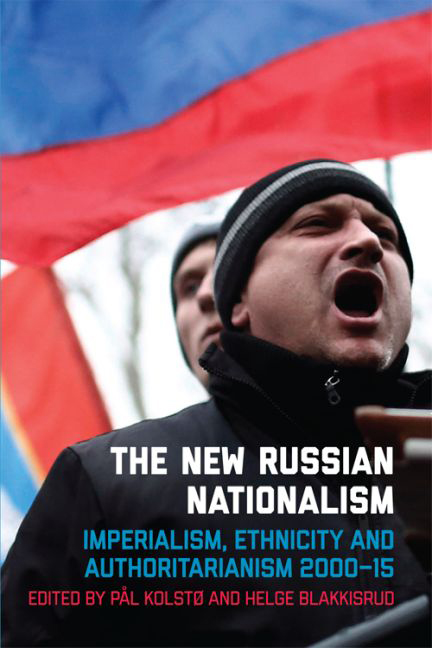Book contents
- Frontmatter
- Contents
- List of Figures
- List of Tables
- Acknowledgements
- Notes on Contributors
- Introduction: Russian nationalism is back – but precisely what does that mean?
- 1 The ethnification of Russian nationalism
- 2 The imperial syndrome and its influence on Russian nationalism
- 3 Radical nationalists from the start of Medvedev's presidency to the war in Donbas: True till death?
- 4 Russian ethnic nationalism and religion today
- 5 Everyday nationalism in Russia in European context: Moscow residents’ perceptions of ethnic minority migrants and migration
- 6 Backing the USSR 2.0: Russia's ethnic minorities and expansionist ethnic Russian nationalism
- 7 Rallying ’round the leader more than the flag: Changes in Russian nationalist public opinion 2013–14
- 8 How nationalism and machine politics mix in Russia
- 9 Blurring the boundary between civic and ethnic: The Kremlin's new approach to national identity under Putin's third term
- 10 Russia as an anti-liberal European civilisation
- 11 Ethnicity and nationhood on Russian state-aligned television: Contextualising geopolitical crisis
- 12 The place of economics in Russian national identity debates
- Bibliography
- Index
2 - The imperial syndrome and its influence on Russian nationalism
- Frontmatter
- Contents
- List of Figures
- List of Tables
- Acknowledgements
- Notes on Contributors
- Introduction: Russian nationalism is back – but precisely what does that mean?
- 1 The ethnification of Russian nationalism
- 2 The imperial syndrome and its influence on Russian nationalism
- 3 Radical nationalists from the start of Medvedev's presidency to the war in Donbas: True till death?
- 4 Russian ethnic nationalism and religion today
- 5 Everyday nationalism in Russia in European context: Moscow residents’ perceptions of ethnic minority migrants and migration
- 6 Backing the USSR 2.0: Russia's ethnic minorities and expansionist ethnic Russian nationalism
- 7 Rallying ’round the leader more than the flag: Changes in Russian nationalist public opinion 2013–14
- 8 How nationalism and machine politics mix in Russia
- 9 Blurring the boundary between civic and ethnic: The Kremlin's new approach to national identity under Putin's third term
- 10 Russia as an anti-liberal European civilisation
- 11 Ethnicity and nationhood on Russian state-aligned television: Contextualising geopolitical crisis
- 12 The place of economics in Russian national identity debates
- Bibliography
- Index
Summary
How to explain the continued presence of the imperial legacy in the political life of Russia, and its impact on Russian nationalism? This has been a focus of my research for more than a decade (Pain 2001, 2004, 2008, 2012). The combination of Russian nationalism and imperial consciousness is conducive to the development of a special phenomenon in Russia that may be called ‘imperial nationalism’. That term may sound odd, at least to those within the Western academic tradition who are accustomed to examining nationalism as one of the factors confronting empires, as a factor involved in destroying the imperial system, but, in the Russian setting, an imperial nationalism that supports imperial aspirations really does exist, and has appeared more than once – recently manifesting itself boldly after the 2014 annexation of Crimea by the Russian Federation. The second decade of the 2000s had begun with political events that – it seemed to many – augured the replacement of imperial nationalism by a new (for Russia) anti-imperial Russian nationalism (Milov 2010; Russkii svet n.d.). Such hopes increased with the rise of the democratic opposition movement and the participation of Russian nationalists in the political protests that began in December 2011. The subsequent defeat of this new, anti-government, anti-Soviet Russian nationalism once again prompts reflection on the reasons for the stability of the imperial component in Russian nationalism – and, indeed, in contemporary Russian society as a whole.
In this chapter I take up some fundamental theoretical problems raised by such scholars as Sergei Gavrov (2004), Alexander Motyl (2004), Dominic Lieven (2005), Mark Beissinger (2005) and Egor Gaidar (2006) as a kind of extended conversation. These are primarily questions about the essence of empire, and the reasons for the reproduction or preservation of some imperial characteristics in the politics of post-Soviet Russia since the turn of the millennium. Here I propose a new theoretical construct – the ‘imperial syndrome’.
- Type
- Chapter
- Information
- The New Russian NationalismImperialism, Ethnicity and Authoritarianism 2000–2015, pp. 46 - 74Publisher: Edinburgh University PressPrint publication year: 2016



